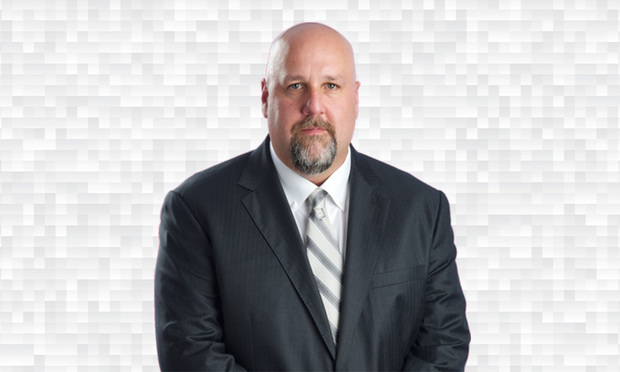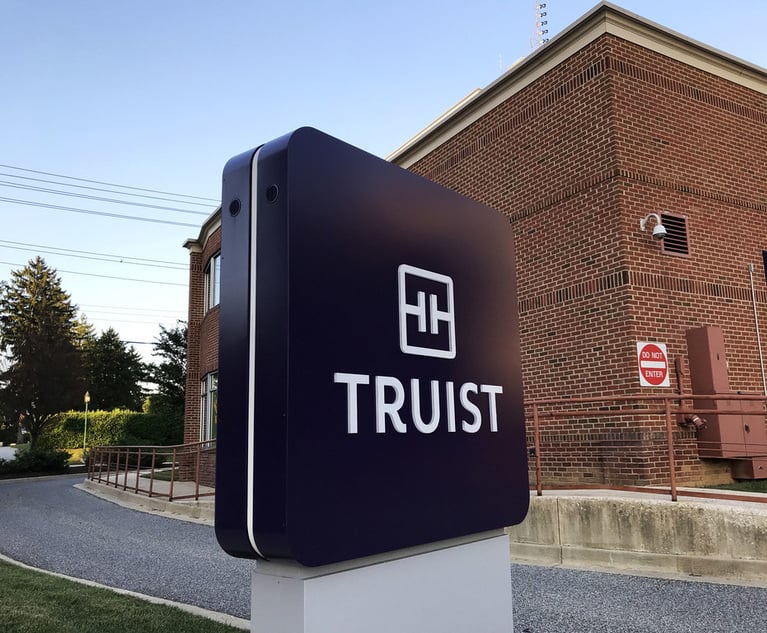Breach Turned Niche: Pittsburgh Lawyer to Co-Lead Equifax Case
For Gary Lynch, a 2013 data breach involving millions of Target customers marked a practice turning point.
February 27, 2018 at 06:08 PM
4 minute read
 Gary Lynch.
Gary Lynch. When news broke less than five years ago that Target had suffered a data breach compromising millions of customers' payment card information, several financial institutions looked to Carlson Lynch Sweet Kilpela & Carpenter, and name partner Gary Lynch in Pittsburgh, to help recover damages.
Now, Lynch has been appointed as co-lead counsel in a national multidistrict litigation brought by over 70 financial institutions against Equifax, related to the company's 2017 data breach. He is also involved in data breach cases against Home Depot, Wendy's and Arby's, among others.
With cybersecurity breaches only expected to rise, data privacy litigation is now the busiest part of Lynch's practice. He spoke with The Legal about how the work has evolved for him and his firm since he became involved in the Target case. Answers have been edited for length and clarity.
What does it mean for you and your firm to be appointed to co-lead this case?
Obviously that's a tremendous honor to be selected by the court to lead the claim. It's really a combination of a lot of work we've gotten. We've been carving out a little bit of a niche with regard to representing financial institutions in claims involving these breaches.
This is a little different because it involves the personal identifying information of the customers [rather than payment card information alone], so it involves an increased risk for the financial institutions.
How much of your business is related to these types of actions?
My personal practice, I would say this is probably 75 to 90 percent of what I do—data breach and privacy litigation. Some of the firm helps me pursue these cases … it's at least 20 to 25 percent of the firm's practice.
How did this niche evolve?
The privacy and data breach area has been burgeoning. It's probably the fastest-growing area for plaintiffs class action work that I see. … We've just ridden that wave.
The idea of representing the financial institutions as part of that … is just a little twist that came from my involvement in the Target case.
[Before the Target breach] my personal practice had been traditional consumer protection and wage-and-hour litigation on behalf of plaintiffs, usually in a class context.
When an opportunity like this arises to create a niche, how do you mold your practice to seize on that opportunity?
We got involved in that [Target] case and took the initiative [to seek out those clients], but the rest of it just evolved organically … it grows naturally, just from the circumstances of it.
What are the implications of this particular action for consumer data issues, and for the financial institutions involved?
The interesting thing about the Equifax case is it involves the data of 145 million consumers. … It implicates almost everyone in this country that's of the age or circumstances to pursue credit.
How does this case compare to the others you've worked on in this type of litigation?
The only comparison I would make from this case to the payment card cases is that both of those cases presented the opportunity to use a legal process to drive a change in how businesses operate.
Have you seen any change in business practices?
There has been a move in the industry [following the Target breach] to chip technology. … I think that stepped up the conversion to chip technology. Whether that will fix the problem remains to be seen. … It feels like the data thieves are always a couple steps ahead.
What do you think lies ahead for data breach litigation?
I don't see any end in sight, until the various industries take decisive action. The problem we've had in the payment card breach area is that the ones who control the area aren't always front-line responsible [for a breach] … by aligning those interests, the risks and the people who have control over it, that's the best way to get change.
This content has been archived. It is available through our partners, LexisNexis® and Bloomberg Law.
To view this content, please continue to their sites.
Not a Lexis Subscriber?
Subscribe Now
Not a Bloomberg Law Subscriber?
Subscribe Now
NOT FOR REPRINT
© 2025 ALM Global, LLC, All Rights Reserved. Request academic re-use from www.copyright.com. All other uses, submit a request to [email protected]. For more information visit Asset & Logo Licensing.
You Might Like
View All
Federal Judge Allows Elderly Woman's Consumer Protection Suit to Proceed Against Citizens Bank
5 minute read
Dilworth Paxson Launches Erie Office With Longtime Local Banking Attorney
4 minute read
Stradley Ronon Bolsters Investment Management Practice With Vanguard Hire
4 minute readTrending Stories
- 1The Gold Standard: Remembering Judge Jeffrey Alker Meyer
- 2NJ Supreme Court Clarifies Affidavit of Merit Requirement for Doctor With Dual Specialties
- 3Whether to Choose State or Federal Court in a Case Involving a Franchise?
- 4Am Law 200 Firms Announce Wave of D.C. Hires in White-Collar, Antitrust, Litigation Practices
- 5K&L Gates Files String of Suits Against Electronics Manufacturer's Competitors, Brightness Misrepresentations
Who Got The Work
J. Brugh Lower of Gibbons has entered an appearance for industrial equipment supplier Devco Corporation in a pending trademark infringement lawsuit. The suit, accusing the defendant of selling knock-off Graco products, was filed Dec. 18 in New Jersey District Court by Rivkin Radler on behalf of Graco Inc. and Graco Minnesota. The case, assigned to U.S. District Judge Zahid N. Quraishi, is 3:24-cv-11294, Graco Inc. et al v. Devco Corporation.
Who Got The Work
Rebecca Maller-Stein and Kent A. Yalowitz of Arnold & Porter Kaye Scholer have entered their appearances for Hanaco Venture Capital and its executives, Lior Prosor and David Frankel, in a pending securities lawsuit. The action, filed on Dec. 24 in New York Southern District Court by Zell, Aron & Co. on behalf of Goldeneye Advisors, accuses the defendants of negligently and fraudulently managing the plaintiff's $1 million investment. The case, assigned to U.S. District Judge Vernon S. Broderick, is 1:24-cv-09918, Goldeneye Advisors, LLC v. Hanaco Venture Capital, Ltd. et al.
Who Got The Work
Attorneys from A&O Shearman has stepped in as defense counsel for Toronto-Dominion Bank and other defendants in a pending securities class action. The suit, filed Dec. 11 in New York Southern District Court by Bleichmar Fonti & Auld, accuses the defendants of concealing the bank's 'pervasive' deficiencies in regards to its compliance with the Bank Secrecy Act and the quality of its anti-money laundering controls. The case, assigned to U.S. District Judge Arun Subramanian, is 1:24-cv-09445, Gonzalez v. The Toronto-Dominion Bank et al.
Who Got The Work
Crown Castle International, a Pennsylvania company providing shared communications infrastructure, has turned to Luke D. Wolf of Gordon Rees Scully Mansukhani to fend off a pending breach-of-contract lawsuit. The court action, filed Nov. 25 in Michigan Eastern District Court by Hooper Hathaway PC on behalf of The Town Residences LLC, accuses Crown Castle of failing to transfer approximately $30,000 in utility payments from T-Mobile in breach of a roof-top lease and assignment agreement. The case, assigned to U.S. District Judge Susan K. Declercq, is 2:24-cv-13131, The Town Residences LLC v. T-Mobile US, Inc. et al.
Who Got The Work
Wilfred P. Coronato and Daniel M. Schwartz of McCarter & English have stepped in as defense counsel to Electrolux Home Products Inc. in a pending product liability lawsuit. The court action, filed Nov. 26 in New York Eastern District Court by Poulos Lopiccolo PC and Nagel Rice LLP on behalf of David Stern, alleges that the defendant's refrigerators’ drawers and shelving repeatedly break and fall apart within months after purchase. The case, assigned to U.S. District Judge Joan M. Azrack, is 2:24-cv-08204, Stern v. Electrolux Home Products, Inc.
Featured Firms
Law Offices of Gary Martin Hays & Associates, P.C.
(470) 294-1674
Law Offices of Mark E. Salomone
(857) 444-6468
Smith & Hassler
(713) 739-1250






